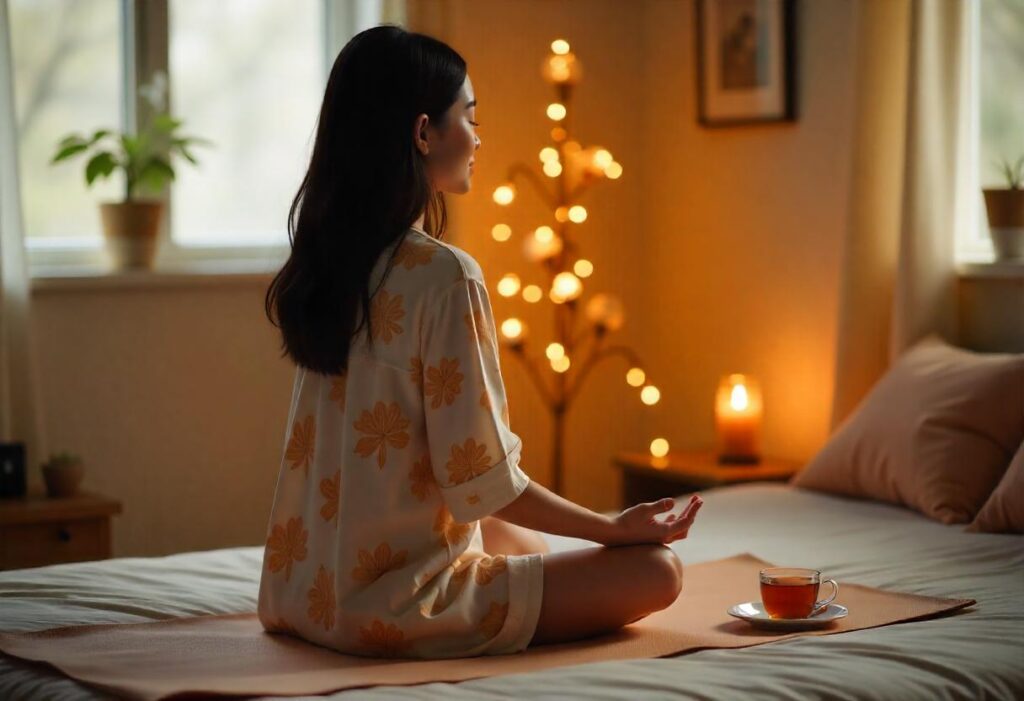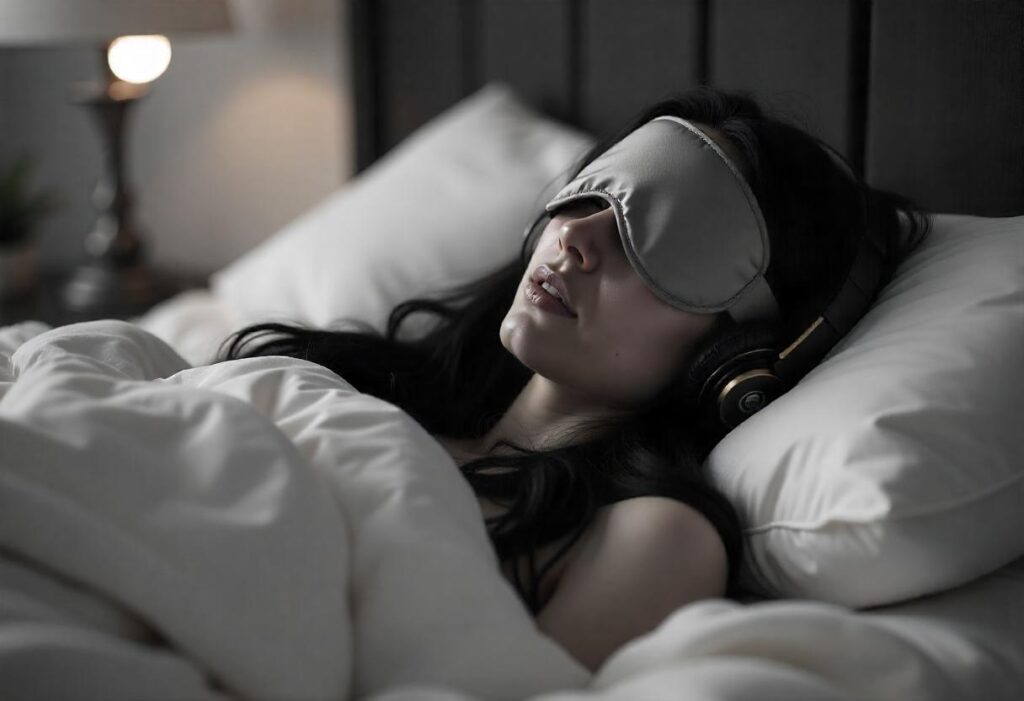Getting a good night’s sleep is essential for overall health and well-being. Yet, many people struggle with sleep issues due to poor sleep hygiene and irregular bedtime habits. If you often find yourself tossing and turning, waking up feeling tired, or struggling with insomnia, it may be time to establish a consistent nighttime routine.
In this blog, we’ll explore how to create an effective nighttime routine that promotes better sleep quality. By following these science-backed steps, you can enjoy deeper, more restorative sleep and wake up feeling refreshed. So, let’s stay with us!
How to Build an Effective Nighttime Routine for Deep Sleep
1. Set a Consistent Sleep Schedule
One of the most important aspects of sleep hygiene is maintaining a consistent sleep schedule. Going to bed and waking up at the same time every day helps regulate your body’s internal clock.
Tips for a Consistent Sleep Schedule:
- Choose a bedtime that allows you to get at least 7–9 hours of sleep.
- Stick to your schedule, even on weekends.
- Avoid napping for too long during the day, as it can disrupt your nighttime sleep.
2. Create a Relaxing Pre-Bedtime Routine
Engaging in relaxing activities before bed signals to your body that it’s time to sleep. A good bedtime habit is to unwind with calming activities at least 30–60 minutes before bed.
Best Pre-Bedtime Activities for Relaxation:
- Reading a Book – Avoid screens and opt for a physical book instead.
- Taking a Warm Bath – Helps lower body temperature, signaling sleep readiness.
- Listening to Soothing Music – Soft instrumental music can promote relaxation.
- Practicing Deep Breathing or Meditation – Reduces stress and promotes better sleep quality.
3. Limit Screen Time Before Bed
Exposure to blue light from screens can interfere with melatonin production, making it harder to fall asleep. Reducing screen time is an essential bedtime habit for improving sleep hygiene.
Ways to Reduce Screen Exposure:
- Avoid smartphones, tablets, and computers at least an hour before bed.
- Use “Night Mode” or blue light filters on devices.
- Opt for activities like journaling or listening to an audiobook instead.
4. Optimize Your Sleep Environment
Your sleep environment plays a crucial role in better sleep quality. A comfortable, dark, and quiet room can help you fall asleep faster and stay asleep longer.
Tips for a Sleep-Friendly Environment:
- Keep Your Room Cool – The ideal sleep temperature is around 60-67°F (15-20°C).
- Use Blackout Curtains – Blocks out external light that may disrupt sleep.
- Minimize Noise – Use earplugs or a white noise machine if needed.
- Invest in a Comfortable Mattress and Pillows – Supports spinal alignment and comfort.
5. Avoid Stimulants and Heavy Meals Before Bed
Certain foods and drinks can interfere with better sleep quality. Avoiding caffeine, nicotine, and heavy meals close to bedtime can help improve sleep hygiene.
Foods and Drinks to Avoid Before Bed:
- Caffeine – Found in coffee, tea, and energy drinks; avoid it at least 6 hours before sleep.
- Alcohol – While it may make you drowsy, it can disrupt sleep later in the night.
- Spicy and Heavy Meals – This can cause indigestion, making it harder to fall asleep.
6. Exercise During the Day
Regular physical activity can promote better sleep quality by reducing stress and regulating sleep cycles. However, exercising too close to bedtime may have the opposite effect.
Best Practices for Sleep-Boosting Exercise:
- Engage in at least 30 minutes of moderate exercise during the day.
- Avoid intense workouts 2–3 hours before bedtime.
- Opt for gentle stretching or yoga in the evening to relax.
Also Read the Latest: How Sleep Tourism Became 2025’s Leading Wellness Trend
7. Manage Stress and Anxiety
Stress and anxiety are common culprits of poor sleep hygiene. Incorporating relaxation techniques into your bedtime habits can promote better sleep quality.
Effective Ways to Reduce Stress Before Bed:
- Practice Mindfulness or Meditation – Helps quiet the mind.
- Write in a Journal – Offload worries onto paper to clear your mind.
- Use Aromatherapy – Scents like lavender can promote relaxation.

8. Establish a No-Work Policy Before Bed
Work-related stress and excessive screen exposure can interfere with your sleep hygiene by increasing mental alertness and delaying melatonin production. Many people struggle with better sleep quality due to late-night work habits, answering emails, or thinking about unfinished tasks. Setting clear boundaries between work and rest is essential to allow your mind and body to relax before bedtime.
How Work Affects Sleep
- Increases Stress & Anxiety – Working late can elevate cortisol levels, making it harder to unwind.
- Exposure to Blue Light – Screens from computers, tablets, and phones emit blue light, which disrupts melatonin production and affects sleep hygiene.
- Overstimulation of the Brain – Engaging in work-related activities before bed can keep your mind racing, making it difficult to fall asleep.
- Creates a Work-Sleep Association – If you constantly check emails in bed, your brain may associate your sleeping space with work, leading to difficulty relaxing.
How to Disconnect from Work Before Bed
To promote better sleep quality, it’s essential to implement strategies that separate work from rest.
1. Set a Cutoff Time for Work
Establish a strict work cutoff time of at least 1–2 hours before bedtime to give your brain time to shift into relaxation mode.
How to Set Work Boundaries:
- Choose a specific time when you will stop checking emails, messages, and work notifications.
- Communicate this boundary to colleagues and clients so they respect your time.
- Use “Do Not Disturb” mode on your phone to block work-related notifications after hours.
2. Create a Bedtime Ritual That Signals the End of the Workday
A structured bedtime routine helps your body transition from work mode to relaxation. Develop a consistent nighttime ritual to reinforce the separation between work and rest.
Ideas for a Work-Free Bedtime Ritual:
- Take a Warm Shower or Bath – This helps reduce stress and lowers body temperature, signaling sleep readiness.
- Change Into Comfortable Sleepwear – Physically changing clothes helps your brain associate bedtime with relaxation.
- Journal or Write a To-Do List for the Next Day – Writing down lingering thoughts can clear your mind and reduce worry.
- Listen to Calming Music or a Sleep Podcast – Soft, soothing sounds can shift your focus away from work-related stress.
Also Read: Why Sleep Deprivation Recovery Programs Are on the Rise!
3. Engage in Non-Work-Related Relaxing Activities
Instead of working late, dedicate your evenings to activities that promote relaxation and improve sleep hygiene.
Relaxing Activities Before Bed:
- Read a Book – Preferably fiction or light reading to avoid overthinking.
- Practice Deep Breathing or Meditation – Techniques like progressive muscle relaxation can reduce stress.
- Stretch or Do Light Yoga – Gentle movements help release built-up tension in the body.
- Have a Conversation with Family or Friends – Engaging in casual, enjoyable conversations can ease stress.
4. Keep Your Bedroom a Work-Free Zone
Creating a clear boundary between work and sleep is essential for better sleep quality. If possible, avoid working from your bed or bedroom altogether.
Ways to Keep Work Out of the Bedroom:
- Set up a dedicated workspace outside your bedroom.
- Avoid bringing laptops, work papers, or office supplies into your sleeping area.
- Use your bed only for sleep and relaxation to strengthen the association between your bedroom and rest.
5. Limit Screen Time Before Bed
Screens emit blue light that suppresses melatonin, making it harder to fall asleep. Reducing screen exposure before bed is a key aspect of sleep hygiene.
How to Reduce Screen Time at Night:
- Stop using electronic devices at least 60–90 minutes before bed.
- If you must use screens, enable blue light filters or wear blue light-blocking glasses.
- Replace screen time with other relaxation techniques, such as listening to audiobooks or practicing mindfulness.
Why a No-Work Policy Before Bed is Important
By setting clear work boundaries and prioritizing bedtime habits, you allow your brain to transition into relaxation mode. This can lead to:
Faster sleep onset – Your mind unwinds properly before bed.
Deeper sleep cycles – Uninterrupted rest improves sleep quality.
Reduced nighttime anxiety – Work-related stress doesn’t follow you into bed.
Increased productivity – Better sleep leads to improved focus and efficiency the next day.
Establishing a no-work policy before bed is a simple yet effective way to create a healthier sleep routine. By making sleep a priority and giving yourself time to unwind, you can wake up feeling more refreshed, energized, and ready for the day ahead.
9. Try Natural Sleep Aids
If you struggle with falling asleep despite improving your sleep hygiene, incorporating natural sleep aids into your routine may be helpful. These remedies can gently support your body’s sleep-wake cycle without the side effects of prescription sleep medications. While natural sleep aids are not a one-size-fits-all solution, they can be effective when combined with healthy bedtime habits and a consistent routine.
Herbal Teas for Relaxation
Drinking a warm cup of herbal tea before bed is a time-tested way to promote better sleep quality. Certain herbs contain calming properties that can help relax your nervous system and prepare your body for rest.
Best Herbal Teas for Sleep:
- Chamomile Tea – One of the most well-known sleep aids, chamomile contains apigenin, an antioxidant that binds to receptors in the brain to reduce anxiety and promote sleepiness.
- Valerian Root Tea – Valerian root has been used for centuries to treat insomnia. It may help reduce the time it takes to fall asleep and improve overall sleep hygiene.
- Lavender Tea – Known for its stress-reducing effects, lavender tea can help soothe the mind and encourage relaxation.
- Lemon Balm Tea – A mild sedative herb that helps reduce anxiety and promote calmness before bed.
- Peppermint Tea – While not directly linked to sleep, peppermint tea aids digestion and relaxation, making it a good choice after dinner.
How to Use Herbal Teas for Sleep:
- Drink a cup of tea about 30–60 minutes before bedtime.
- Avoid adding caffeine-containing ingredients, such as black or green tea, as they may counteract the relaxing effects.
- Make it part of your nightly bedtime habit to signal to your body that it’s time to wind down.
Also Read the Latest: Why Blue Light Disrupts Sleep and How to Avoid It (2025)?
Magnesium Supplements for Better Sleep
Magnesium is an essential mineral that plays a key role in regulating sleep. It helps activate the parasympathetic nervous system, which promotes relaxation and reduces stress, two crucial factors for better sleep quality.
Benefits of Magnesium for Sleep:
- Helps relax muscles and reduce tension.
- Supports melatonin production, a hormone essential for sleep regulation.
- Lowers cortisol levels, reducing nighttime stress and anxiety.
Best Magnesium Forms for Sleep:
- Magnesium Glycinate – Best for relaxation and stress reduction.
- Magnesium Citrate – Supports digestion and relaxation.
- Magnesium L-Threonate – May enhance brain function and improve sleep.
- Magnesium Chloride – Often found in topical sprays for muscle relaxation.
How to Take Magnesium for Sleep:
- Take 200-400 mg about 30–60 minutes before bed.
- If using a topical magnesium spray, apply it to your skin before bedtime.
- Avoid overuse, as too much magnesium can cause digestive issues.
Melatonin Supplements for Regulating Sleep Cycles
Melatonin is a naturally occurring hormone that signals to your body when it’s time to sleep. Your body typically produces melatonin in response to darkness, but factors like artificial light, irregular sleep schedules, and stress can disrupt its production.
How Melatonin Improves Sleep:
- Helps regulate your circadian rhythm, making it easier to fall asleep at a consistent time.
- Beneficial for those suffering from jet lag, shift work sleep disturbances, or insomnia.
- Can help reduce the time it takes to fall asleep.
How to Use Melatonin for Sleep:
- Start with a low dose (0.5–3 mg) about 30–60 minutes before bedtime.
- Avoid taking it every night for extended periods, as your body may become dependent on external sources.
- Pair melatonin with good sleep hygiene to enhance its effectiveness.

Additional Natural Sleep Aids
Aside from herbal teas, magnesium, and melatonin, other natural supplements can support better sleep quality.
1. L-Theanine – Found in green tea (but available in supplement form without caffeine), L-Theanine promotes relaxation and reduces stress without causing drowsiness.
2. Glycine – An amino acid that may help lower body temperature and improve sleep onset. Studies suggest that taking 3 grams of glycine before bed can enhance sleep quality.
3. Passionflower – A natural herb that has mild sedative properties, making it helpful for those struggling with anxiety-related insomnia.
4. CBD (Cannabidiol) Oil – Derived from hemp, CBD may help reduce stress and promote deeper sleep by interacting with the body’s endocannabinoid system.
5. Ashwagandha – An adaptogenic herb that helps lower cortisol levels, reducing stress and promoting relaxation before bed.
How to Choose the Right Natural Sleep Aid
The best natural sleep aid depends on the root cause of your sleep difficulties:
- If you struggle with stress or anxiety, try chamomile tea, L-theanine, or CBD oil.
- If muscle tension or restlessness keeps you awake, consider magnesium or passionflower.
- If your sleep schedule is irregular or you suffer from jet lag, melatonin may be the best option.
- If you wake up frequently during the night, glycine or ashwagandha may help promote deeper sleep.
Before adding supplements to your routine, consult a healthcare provider, especially if you are taking medications or have underlying health conditions.
Real-Life Case Studies | How a Nighttime Routine Transformed Sleep
At Active Health Sport, we’ve spoken with individuals who struggled with poor sleep for years, until they implemented a structured nighttime routine. Here are three powerful stories of how small yet consistent changes helped them achieve deep, restorative sleep.
1. Daniela Ortega – From Restless Nights to Deep Sleep
Daniela, a 38-year-old marketing executive, had suffered from chronic sleep deprivation due to late-night work emails, excessive screen time, and an inconsistent bedtime. She often woke up feeling exhausted, relying on caffeine to push through the day.
After consulting a sleep coach, Daniela made significant changes. She set a strict “no screens after 9 PM” rule, replaced late-night work with light reading, and began journaling to clear her mind before bed. She also introduced a cup of chamomile tea and dim lighting to signal her body that it was time to wind down. Within a month, her sleep quality improved dramatically. She now wakes up refreshed and focused, no longer experiencing the afternoon energy crashes that once plagued her.
2. Juan Manuel – Overcoming Insomnia with a Personalized Routine
Juan, a 45-year-old fitness trainer, had struggled with insomnia for over a decade. Despite his active lifestyle, he found it difficult to fall asleep, often tossing and turning for hours. His biggest challenge? An overstimulated mind from social media scrolling and intense workouts late in the evening.
Determined to improve his sleep, Juan made crucial adjustments. He swapped his late-night workouts for morning sessions and started practicing guided meditation 30 minutes before bed. He also created a dedicated sleep environment by using blackout curtains and a white noise machine. Within weeks, Juan noticed he was falling asleep faster and staying asleep longer. Today, he credits his structured nighttime routine for helping him feel more energized and alert during the day.
3. Jessa Grace Billona – Beating Sleep Anxiety with Consistency
Jessa, a 30-year-old nurse, faced severe sleep anxiety due to irregular work shifts. Some nights, she slept soundly, while others were filled with restlessness and frustration. Her unpredictable schedule made it nearly impossible to maintain a consistent bedtime routine.
Seeking a solution, Jessa worked on improving her sleep hygiene. She implemented a “wind-down window,” dedicating at least 45 minutes before bed to calming activities like stretching, deep breathing, and listening to soothing music. Even when her shifts varied, she ensured she followed this routine consistently. She also limited caffeine intake after 3 PM and adopted a sleep-friendly diet rich in magnesium and melatonin-boosting foods. Within two months, her sleep had stabilized, and she felt significantly less anxious at bedtime.
These three individuals prove that the right nighttime routine can be a game-changer for sleep health. Whether it’s reducing screen time, practicing mindfulness, or maintaining a sleep-friendly diet, small adjustments can lead to transformative results. If you’re struggling with restless nights, consider building a routine that works for you, because quality sleep isn’t a luxury, it’s a necessity for overall well-being.
Closing Thoughts
Creating a nighttime routine for better sleep quality doesn’t have to be complicated or overwhelming. Small, intentional changes in your bedtime habits can lead to a profound improvement in how well you sleep and how energized you feel the next day. Prioritizing sleep hygiene, such as reducing screen time, establishing a calming pre-sleep routine, and maintaining a consistent sleep schedule, can help signal your body that it’s time to wind down.
Quality sleep isn’t just about getting enough hours; it’s about ensuring rest and rejuvenating hours. Whether it’s incorporating relaxation techniques, adjusting your environment for optimal comfort, or making mindful choices about what you eat and drink before bed, every step counts. Over time, these habits will become second nature, allowing you to wake up refreshed, focused, and ready to take on the day.
Why wait? Start implementing these steps tonight and see the difference for yourself! If you have any questions or personal sleep tips to share, feel free to comment below or email us, we’d love to hear from you and support you on your journey to better sleep. Sweet dreams! 🌙✨
You might also like…
- Why Mobility Matters More Than Muscle for CrossFit Progress
 In CrossFit culture, strength numbers often steal the spotlight: heavier deadlifts, faster WOD times, and bigger PRs. While muscle and power are essential, they are not the limiting factor for long-term CrossFit progress.… Read more: Why Mobility Matters More Than Muscle for CrossFit Progress
In CrossFit culture, strength numbers often steal the spotlight: heavier deadlifts, faster WOD times, and bigger PRs. While muscle and power are essential, they are not the limiting factor for long-term CrossFit progress.… Read more: Why Mobility Matters More Than Muscle for CrossFit Progress - Zone-2 Walking for CrossFit Athletes Explained
 In CrossFit, conditioning is often associated with intense, fast-paced WODs, high heart rates, and breathless finishes. While this intensity builds power and short-term fitness, it does not fully support aerobic efficiency, recovery capacity,… Read more: Zone-2 Walking for CrossFit Athletes Explained
In CrossFit, conditioning is often associated with intense, fast-paced WODs, high heart rates, and breathless finishes. While this intensity builds power and short-term fitness, it does not fully support aerobic efficiency, recovery capacity,… Read more: Zone-2 Walking for CrossFit Athletes Explained - How Low-Intensity Walking Restores the Nervous System
 CrossFit is designed to test physical limits. Heavy lifts, fast-paced metabolic conditioning, and complex gymnastic movements demand not only muscular strength but also significant nervous system output. While most athletes focus on muscle… Read more: How Low-Intensity Walking Restores the Nervous System
CrossFit is designed to test physical limits. Heavy lifts, fast-paced metabolic conditioning, and complex gymnastic movements demand not only muscular strength but also significant nervous system output. While most athletes focus on muscle… Read more: How Low-Intensity Walking Restores the Nervous System

Kait Amazra is the founder and lead writer of Active Health Sport. With over 25 years of experience in health, fitness, and wellness education, Kait combines professional expertise with a passion for helping people live stronger, healthier, and more balanced lives.
As a licensed health and fitness professional, Kait has worked alongside industry experts to deliver evidence-based insights on physical activity, nutrition, recovery, and holistic well-being. Through Active Health Sport, Kait’s mission is to make trusted, practical, and science-backed health information accessible to everyone, from beginners building new habits to athletes seeking peak performance.

